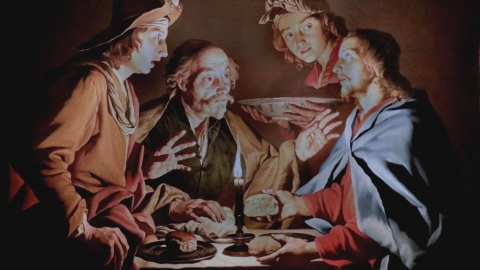The Bishop of Mainz Wants to Change the Irreformable Teaching of the Church

Mgr Peter Kohlgraf
Among the topics that will be discussed during the Synodal Path in Germany, the issue of homosexuality is prominently featured: it is approached very positively in the “outline” developed in the second Preparatory Forum, published on September 10, 2019.
Assessments of the Working Document on Homosexuality
In this document the authors, using deeply flawed moral principles, came to the following conclusion: “Homosexual actions realize positive values, in as much they are an expression of friendship, trustworthiness, loyalty, faith, and support in life.”
Further on, the text even justified homosexual unions. “The relationships in which values such as love, friendship, reliability, fidelity, reciprocity in the existence of each other are lived, deserve moral recognition and respect, even independently of their sexual orientation.”
With such principles, the Mafia deserves recognition and respect ... because there is friendship, loyalty, reciprocity, etc., there.
The text states: “This approach applies to same-sex spouses as well as to remarried divorcees.” This is why “it is necessary to unconditionally recognize same-sex partnerships and to refrain from morally disqualifying the sexual practice that results from them. ...The liturgical appreciation of these values must also be considered.”
The “Word of the Bishop” of Mainz
It is precisely on this last point—liturgical appreciation—that Msgr. Peter Kohlgraf, bishop of Mainz since April 2017, has focused. In the section in the “Word of the Bishop” of February 3, 2021, on the website of the Diocese of Mainz, he explains his thoughts to us on this subject.
Msgr. Kohlgraf begins by explaining that science must be a source of theological reflection, and he recalls the meeting of the Commission for Marriage and the Family of the German Bishops' Conference held on Wednesday, December 4, 2019 in Berlin with the participation of sexologists, theologians, and specialists in canon law.
There was a consensus that “human sexual orientation is expressed at puberty and involves a heterosexual or homosexual orientation [sic]. Both belong to the normal forms of sexual predisposition, which cannot or should not be changed by a specific socialization.”
The commission’s statement continued: “Whether the ban on homosexuality by [the Church’s] teaching authorities is still appropriate today has been the subject of controversy.”
Related links
(Sources : kath.net/katholisch.de/bistummainz.de – FSSPX.Actualités)
Illustration : Olaf Kosinsky, CC BY-SA 3.0 DE, via Wikimedia Commons



